(完整)外研社一起小学三年级下语法总结及练习题,推荐文档
外研社一年级起点三下英语知识清单

外研社一年级起点三年级下册知识点 aliu 整理第一课(一般将来时)1、如何描述人物的性格特点.句型结构:主语+be动词+表示性格特点的形容词.Be动词应随主语的人称和数的变化而变化.表示人物性格特点的形容词有:shy腼腆 quiet文静的 naughty淘气 clever聪明 nice友好,亲切 a bit+形容词有点...例句: I’m a bit quiet.我有点文静.She’s very nice.她很友好.人物外貌描写:某人+be动词{变化} + 表示外貌特征的形容词 big,I am very tall.我很高. My sister is beautiful.我姐姐很漂亮.You are thin. 你很瘦.某人+ have / has got (a/an) +形容词+名词.She has got two big eyes.她有两只大眼睛.I have got long hair.我梳着长发.2、介绍某人的句型句型结构:This is +人名,在人名前不加任何冠词.或者 This is +形容词性物主代词+称呼This is Maomao. 这是毛毛.3、表达自己打算帮助某人的句型句型结构:I’m going to help + 某人.某人若为人称代词,要用宾格形式.I’m going to help her.我打算帮助她. help you帮助你help him帮助他4、含有begoingto的一般将来时,表示计划、打算做某事,常与 tomorrow ,next week ,the day sfter tomorrow 等时间状语连用.句型结构:主语+ begoingto + 动词原形 (+其他)I’m going to do my homework. 我打算做家庭作业.5、如何表达自己很乐于助人I’m helpful.我很乐于助人.He/she is helpful.他/她很乐于助人 .They are helpful.他们/她们很乐于助人.6表达某人不会做某事的句型主语+can’t +动词原形(swim,sing,dance...)+其他.can’t 是 can not的缩写形式,意思为“不会”,与动词原形搭配使用.What can you do 你们会做什么I can sing. 我会唱歌.I can’t sing,but I can play the piano.我不会唱歌,但我会弹钢琴.This little girl can’t do her Maths.这个小女孩不会做数学题. (Science科学、)第二课1、如何运用形容词描述事物句型结构:主语+be动词+形容词,形容词前可以加 very (非常) ,quite(相当)等.This park is new. It’s very beautiful. And it’s very big. 这个公园是新建的.它非常漂亮.并且它非常大.2、表达对方将看见某(些)事物的句型句型结构:You’ll see +某(些)事物. will 是一般将来时的标志词之一.与动词原形搭配使用.You’ll see tigers and lions. 你将看见老虎和狮子.第三课1表达某些人将去某地的句型句型结构:主语+will go (to)+地点.这是一个一般将来时的句子,用于表达将要去某地. will 没有人称和数的变化,与其搭配的动词用原形.地点若为副词 home、 there ,则省略介词 to.We’ll go to the library.我们将要去图书馆. We’ll go home.2、含有will一般将来时will 没有人称和数的变化,与其搭配的动词用原形.句型结构:肯定句主语+will+动词原形(+其他).I’ll make a birthday cake for hi m. 我将要为他制作一个生日蛋糕.否定句主语+ won’t +动词原形(+其他).I won’t call you.我将不会给你打.疑问句:will + 主语 + 动词原形(+其他)Will you go with me你将要和我一起去吗3、表达将要做某事的句型主语+will+动词原形(+其他)我爸爸明天将要去钓鱼.My father will go fishing tomorrow.4、如何询问对方周末计划问句:What will you do this weekend答语:I/We will+动词原形(+其他)I/We will go swimming. 我将要去游泳.5、如何询问某人是否将要做某事此问句是will开头的一般将来时的一般疑问句.问句:W ill + 主语 + 动词原形(+其他)答语: Yes,主语+will. / No ,主语+ won’t.6、询问我们是否将要做某事的句型问句:Will we + 动词原形(+其他)答语: Yes , we will. / No ,we won’t.第四课1、如何表达某人将要做某事某人 + will + 动词原形(+其他)Will为情态动词,与动词原形搭配使用,没有人称和数的变化.在一般将来时的句子中,常有 tomorrow(明天),next year(明年), next month (下个月) ,the day after tomorrow (后天),soon(不久)等时间状语. I will have a party with my friends. 我将和我的朋友们举办一个聚会.2、了解基数词英语中数词包括基数词和序数词.表示人或事物的数量时用基数词.全59页巧学妙计:1到12分别记,13到19都带-teen.20到90整十数,-ty结尾是后缀.要是表示几十几,连字符整十连个位.要是表示几百几,hundred之后加and立.基数词:1 one 2 two 3 three 4 four 5 five 6 six 7 seven 8 eight 9 nine10 ten 11 eleven 12 twelve 13 thirteen 14 fourteen 15 fifteen 16 sixteen17 seventeen 18 eighteen 19 nineteen 20 twenty 21 twenty-one 22twenty-two 23 twenty-three 24 twenty-four 25 twenty-five 26 twenty-six27 twenty-seven 28 twenty-eight 29 twenty-nine 30 thirty3、询问某人询问事物数量的句型问句: How many + 可数名词复数答语:基数词+(可数名词单数或复数)How many monkeys Eleven monkeys. 十一只猴子第五课1、询问对方是否将要做某事的句型句型结构问句: Will you +动词原形(+其他)答语: Yes,I/we will. No,I/we won’t.2、Why not 的用法为什么不了3、如何描述自己将在星期几做某事句型结构: On +星期名称,I’ll + 动词原形(+其他)例句:在星期日你们将要做什么What will you do on Sunday在星期日,我将和我的朋友们打篮球.On Sunday, I will play basketball with my friends.4、询问她是否要在星期几做某事.问句:Will he/she +动词(短语)原形+on+星期名称答语:Yes,he /she will. No,he /she won’t.表示在星期几,在星期名词前要加 on.星期天 day 、 Monday、 Tuesday、星期三 Wednesday、星期四 Thursday、星期五 Friday、星期六 urday.第六课1、here开头的句子.Here+主语(人称代词)+动词当句子主语是人称代词时,动词要置于主语之后. Here it is. 它在这儿.Here++动词+主语(名词)当句子主语是名词时,动词要置于主语之前.Here are your books.这些是你的书.2、提出行动建议的句型让他人与自己一起做某事.句型结构:Let’s +动词原形+其他Let’s draw a monster 让我们画一个怪物吧3、There be 句型见教材第七课1、询问某地是否有某人某物的句型.见教材问句:Are there +可数名词复数 +地点答语:Yes,there are./No,there aren’t.2、如何询问在某处的事物的数量问句:How many +可数名词复数 +are there +地点答语:There is /are +基数词./ 基数词.第八模块(一般现在时)1、描述今天是某个特殊日子的句型句型结构: It’s+日子+today. It’s Parents’Day today.今天是家长日. 常见节日的英文表达:2、描述某人努力学习的句型.时态是一般现在时,表示经常发生的动作、行为或存在的状态.若主语为第三人称单数,要用动词第三人称单数形式+s works.主语+work(s) hard. She (lingling)works hard.3、如何询问他人的性格特点.问句:Is+主语(第三人称单数)+形容词(+其它)答语:Yes,he/she is. /No,he/she isn’t.大明在课上淘气吗 Is Daming naughty in class不,他不淘气.No, he isn’t.4、如何评价他人的功课His /Her work is good. 他的功课很好.His /Her work is+形容词.5、如何表达某人对某事很满意.主语+be动词+happy with+其他.Be动词要根据主语的人称和数来确定.With是对于的意思.I’m happy with that. 我对那个很满意.6、如何描述他人很或非常擅长某学科.7、主语(第三人单数)+is (very /quite) good+学科.She’s very good at Maths.她非常擅长数学.表达某人不擅长某学科,在is的后面加 not .But she isn’t good at Art.但她不擅长美术.当我们想表达某些人某人非常擅长某学科时,be动词随着主语人称和数的变化而变化.I’m very good at English .They are quite good at Chinese .他们非常擅长语文.7、描述他人或其他人称不努力学习某学科的句型.主语(第三人称单数)+doesn’t work hard at +学科.Lingling doesn’t work hard at Science. 玲玲不努力学习科学.当主语不是第三人称单数时,在动词 work 前加 don’t.I (You / Lily and Mike )don’t work hard at English.第九模块(一般过去时)8、如何描述某人过去的外貌特征.主语+was/ wasn’t/were/weren’t +表示外貌特征的形容词(+then).描述某人过去的外貌特征时,时态要用一般过去时.Then 意思为“那时”,是表示过去的时间状语.Is 和 am 过去时是was ,否定式是 was not ,缩写成 wasn’t ;Are 的过去时是were ,否定式是 were not,缩写成 weren’t .My father wasn’t fat then.He was very thin.我爸爸那时不胖,他很瘦.1、如何描述某人现在的外貌特征,时态要用一般现在时.Be随主语人称和数的变化而变化.主语+is /am/are (not) + 表示外貌特征的形容词(+now)He is tall and strong now. 他现在又高又强壮.2、含有be 动词的一般过去时的句子肯定句:主语+was/were +其他. I was late yesterday.我昨天迟到了.否定句:主语+was/were not +其他.We weren’t late yesterday.我们昨天没迟到.一般疑问句:Was / were +主语+其他Were you ill yesterday 你昨天生病了吗Yes, I was. 是的,我生病了. /No,I wasn’t.不,我没生病.3、描述某人过去在某地的句型一般过去时,主语+was /were in/ at+地点. 主语是第一人称单数和第三人称单数时,be 动词用was,其他情况用were. 大地点用in,如在哪个城市,小地点用at.He was in Hong Kong.他在香港.I was with Daming at his home yesterday. 昨天我和大明在他的家里.第十模块1、询问对方过去是否在某地的句型.一般现在时问句:Were you+地点答语:Yes,I was/ We were . / No,I wasn’t /we weren’t.Were you on the second floor 你们刚刚在二楼吗 Yes,We were.是的,我们在.2、描述某人过去在几楼的句型序数词主语+ was/were on the +序数词+ floor .We were on the first floor. 我们刚刚在一楼.3、如何询问他人过去是否在某地Was Daming there大明在那里吗 No,he wasn’t.不,他不在.问句:was+主语(第三人称单数)+地点答语:Yes, he/she was. /No,he/she wasn’t.4、如何描述某物过去所在的位置.They were here last Sunday.上个星期日它们在这里.hey were under the bed yesterday .昨天它们在床下面.5、询问某物现在所在的位置Where are the vegetables蔬菜在哪里Where is /are the+某物Where are the cakes 蛋糕在哪里。
外研社一起三年级下册英语知识点
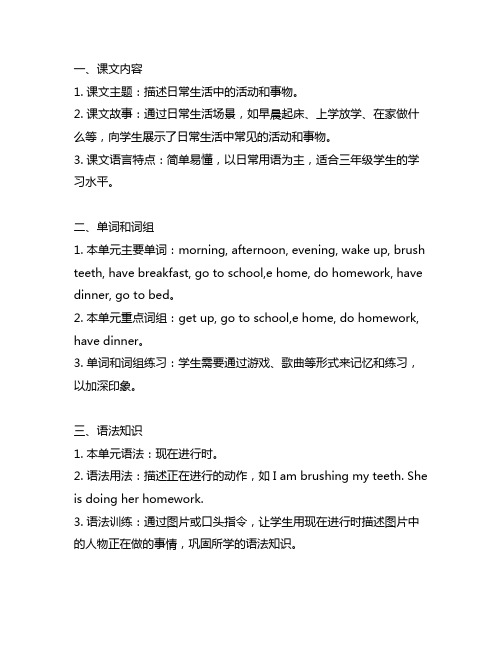
一、课文内容1. 课文主题:描述日常生活中的活动和事物。
2. 课文故事:通过日常生活场景,如早晨起床、上学放学、在家做什么等,向学生展示了日常生活中常见的活动和事物。
3. 课文语言特点:简单易懂,以日常用语为主,适合三年级学生的学习水平。
二、单词和词组1. 本单元主要单词:morning, afternoon, evening, wake up, brush teeth, have breakfast, go to school,e home, do homework, have dinner, go to bed。
2. 本单元重点词组:get up, go to school,e home, do homework, have dinner。
3. 单词和词组练习:学生需要通过游戏、歌曲等形式来记忆和练习,以加深印象。
三、语法知识1. 本单元语法:现在进行时。
2. 语法用法:描述正在进行的动作,如I am brushing my teeth. She is doing her homework.3. 语法训练:通过图片或口头指令,让学生用现在进行时描述图片中的人物正在做的事情,巩固所学的语法知识。
四、听说读写技能1. 听:通过听力练习,让学生能够听懂日常生活中的常见活动和事物的名称。
2. 说:通过口语练习,让学生能够用英语描述自己日常生活中的活动。
3. 读:通过阅读课文和相关练习,让学生掌握本单元的词汇和句型。
4. 写:通过书写练习,让学生能够用英语描述自己的日常生活,并且能够正确使用现在进行时。
五、学习方法1. 多听:通过听力练习,让学生多次听到课文内容和相关单词,以加强记忆。
2. 多说:引导学生多说英语,如用英语描述自己的日常活动。
3. 多读:通过阅读相关练习,让学生熟练掌握本单元的词汇和句型。
4. 多写:通过书写练习,让学生巩固所学的语法知识,提高书面表达能力。
总结:本单元主要内容是描述日常生活中的活动和事物,重点单词和词组包括morning, afternoon, evening, wake up, brush teeth, have breakfast, go to school,e home, do homework, have dinner, go to bed。
外研社一起点三年级下学期英语知识点
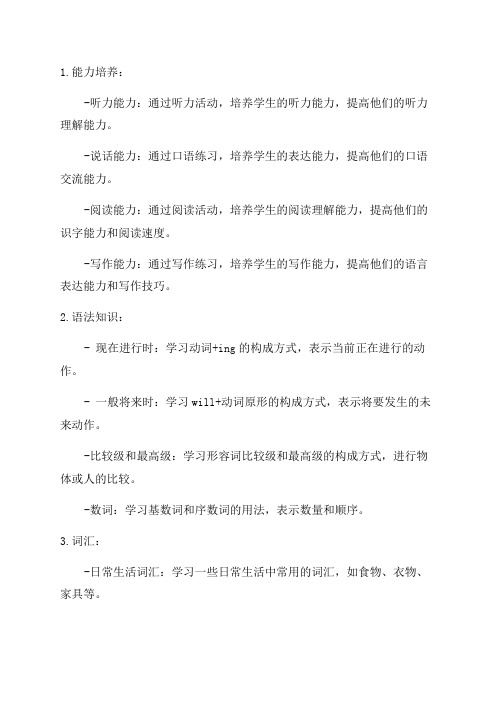
1.能力培养:-听力能力:通过听力活动,培养学生的听力能力,提高他们的听力理解能力。
-说话能力:通过口语练习,培养学生的表达能力,提高他们的口语交流能力。
-阅读能力:通过阅读活动,培养学生的阅读理解能力,提高他们的识字能力和阅读速度。
-写作能力:通过写作练习,培养学生的写作能力,提高他们的语言表达能力和写作技巧。
2.语法知识:- 现在进行时:学习动词+ing的构成方式,表示当前正在进行的动作。
- 一般将来时:学习will+动词原形的构成方式,表示将要发生的未来动作。
-比较级和最高级:学习形容词比较级和最高级的构成方式,进行物体或人的比较。
-数词:学习基数词和序数词的用法,表示数量和顺序。
3.词汇:-日常生活词汇:学习一些日常生活中常用的词汇,如食物、衣物、家具等。
- 动词词组:学习一些常用的动词词组,如go to、have a picnic 等。
- 形容词词组:学习一些常用的形容词词组,如big and tall、long and curly等。
4.交际用语:- 问候语:学习一些基本的问候语,如Hello、How are you?等。
- 自我介绍:学习如何进行简单的自我介绍,如My name is…等。
- 请求和邀请:学习如何进行请求和邀请,如Can I have…?、Would you like…?等。
- 喜好和能力:学习如何表达自己的喜好和能力,如I like…、I can…等。
5.句型和表达:- What are you doing?:学习询问他人正在做什么的句型,如What are you doing?- I can…:学习表达自己的能力的句型,如I can swim.- How many… do you have?:学习询问数量的句型,如How many books do you have?6.阅读理解:。
外研社(三年级起)英语三年级下册各单元重点句型汇总
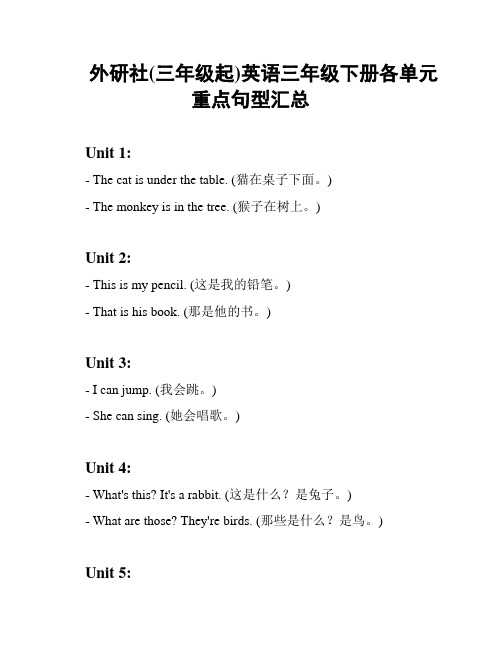
外研社(三年级起)英语三年级下册各单元重点句型汇总Unit 1:- The cat is under the table. (猫在桌子下面。
)- The monkey is in the tree. (猴子在树上。
)Unit 2:- This is my pencil. (这是我的铅笔。
)- That is his book. (那是他的书。
)Unit 3:- I can jump. (我会跳。
)- She can sing. (她会唱歌。
)Unit 4:- What's this? It's a rabbit. (这是什么?是兔子。
)- What are those? They're birds. (那些是什么?是鸟。
)Unit 5:- What do you want? I want a toy car. (你想要什么?我想要一辆玩具车。
)- What does she want? She wants a doll. (她想要什么?她想要一个洋娃娃。
)Unit 6:- Can you swim? Yes, I can. (你会游泳吗?是的,我会。
)- Can he run? No, he can't. (他会跑步吗?不,他不会。
)Unit 7:- I like dogs. (我喜欢狗。
)- She likes cats. (她喜欢猫。
)Unit 8:- Where are you going? I'm going to the park. (你去哪里?我去公园。
)- Where is he going? He's going to the supermarket. (他去哪里?他去超市。
)Unit 9:- I have a new dress. (我有一条新裙子。
)- He has a big balloon. (他有一个大气球。
)Unit 10:- What color is it? It's blue. (它是什么颜色?它是蓝色的。
外研版一年级起点三年级下册重点语法及知识点
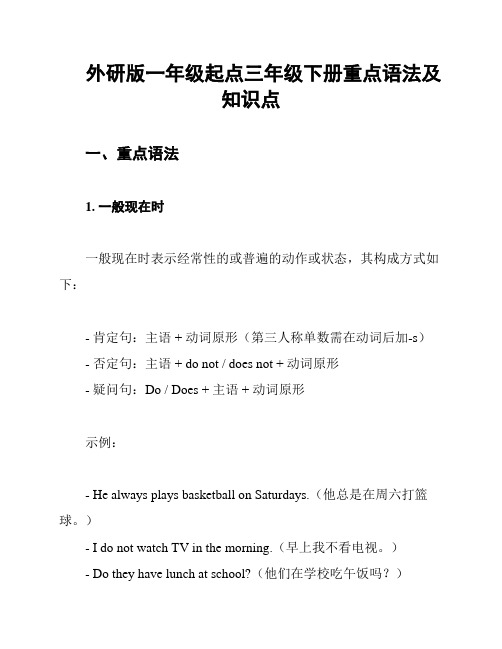
外研版一年级起点三年级下册重点语法及知识点一、重点语法1. 一般现在时一般现在时表示经常性的或普遍的动作或状态,其构成方式如下:- 肯定句:主语 + 动词原形(第三人称单数需在动词后加-s)- 否定句:主语 + do not / does not + 动词原形- 疑问句:Do / Does + 主语 + 动词原形示例:- He always plays basketball on Saturdays.(他总是在周六打篮球。
)- I do not watch TV in the morning.(早上我不看电视。
)- Do they have lunch at school?(他们在学校吃午饭吗?)2. 一般过去时一般过去时表示过去发生的动作或存在的状态,其构成方式如下:- 肯定句:主语 + 动词过去式- 否定句:主语 + did not + 动词原形- 疑问句:Did + 主语 + 动词原形示例:- We visited the zoo last week.(我们上周参观了动物园。
)- She didn't go to the party yesterday.(她昨天没有去参加聚会。
)- Did you have breakfast this morning?(今天早上你吃过早饭了吗?)3. 现在进行时现在进行时表示现在正在进行的动作,其构成方式如下:- 肯定句:主语 + am / is / are + 动词-ing- 否定句:主语 + am / is / are + not + 动词-ing- 疑问句:Am / Is / Are + 主语 + 动词-ing示例:- They are playing in the park now.(他们正在公园里玩。
)- I am not studying right now.(我现在不在研究。
)- Is she watching TV at home?(她在家看电视吗?)二、重点知识点1. 数字在外研版一年级起点三年级下册中,会研究如何读写数字和进行简单的数学运算。
外研社一起三年级英语下册语法总结

外研社一起三年级英语下册语法总结三年级英语下册语法点总结,一共7个,整理课本中典型代表语句,方便孩子理解,做好复习、预习,轻松搞定整学期语法。
语法点一形容词(adjective),简称adj.或a.一、含义:形容词用来描写或修饰名词或代词,表示人或事物的属性、状态或特征。
课文中功能句式:1、she’s very nice. 她很友好。
2、It’s a very old clock. 它是一个非常古老的钟。
3、I feel tired now. 我现在很累。
4、Is Daming naughty in class? 大明在课上淘气吗?5、Ms Smart is very happy with your work. 斯玛特女士对你的功课很满意。
二、形容词的用法1、作定语修饰人,表示人的属性、状态或特征。
例如:He’s a clever boy.他是一个聪明的男孩。
They very young then.他们那时很年轻。
He isn’t lazy.他不懒。
I’m very tall.我很高。
2、作定语修饰物,表示事物的属性、状态或特征。
例如:The river is very wide.这条河很宽。
The panda is very cute.这只熊猫很可爱。
It’s a black cat.它是一只黑猫。
记忆口诀:形容词句中作定语,放在名词、代词前。
不但可以修饰人,还能把物来评点。
三、形容词大致分类:1、品质形容词,表示人或物的品质。
例如:an old clock一个古老的钟2、颜色形容词,表示事物的颜色。
例如:blue sky 蓝天3、类属形容词,表示事物的类属。
例如:China is an Eastern country.中国是一个东方国家。
语法点二一般将来时be going to 结构含义:“be going to+动词原形”表示打算、计划或决定要做某事。
课文中功能句式:1、I’m going to help her.我打算帮助她。
三年级英语外研版下册(三年级起点)
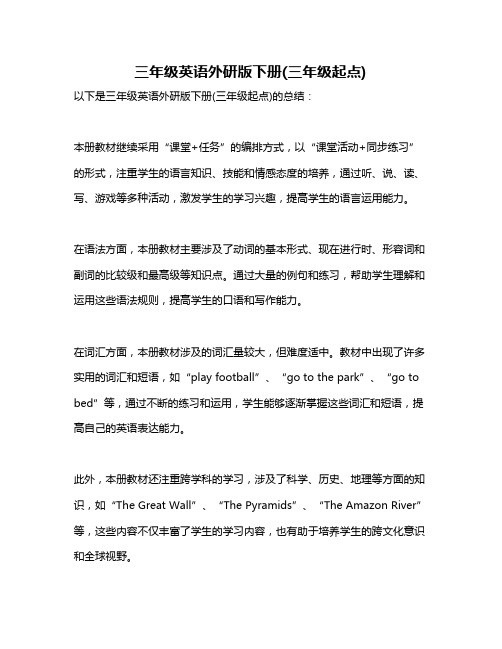
三年级英语外研版下册(三年级起点)
以下是三年级英语外研版下册(三年级起点)的总结:
本册教材继续采用“课堂+任务”的编排方式,以“课堂活动+同步练习”的形式,注重学生的语言知识、技能和情感态度的培养,通过听、说、读、写、游戏等多种活动,激发学生的学习兴趣,提高学生的语言运用能力。
在语法方面,本册教材主要涉及了动词的基本形式、现在进行时、形容词和副词的比较级和最高级等知识点。
通过大量的例句和练习,帮助学生理解和运用这些语法规则,提高学生的口语和写作能力。
在词汇方面,本册教材涉及的词汇量较大,但难度适中。
教材中出现了许多实用的词汇和短语,如“play football”、“go to the park”、“go to bed”等,通过不断的练习和运用,学生能够逐渐掌握这些词汇和短语,提高自己的英语表达能力。
此外,本册教材还注重跨学科的学习,涉及了科学、历史、地理等方面的知识,如“The Great Wall”、“The Pyramids”、“The Amazon River”等,这些内容不仅丰富了学生的学习内容,也有助于培养学生的跨文化意识和全球视野。
总的来说,三年级英语外研版下册(三年级起点)是一本适合三年级学生使用的英语教材,通过本册教材的学习,学生能够掌握基本的英语知识和技能,提高自己的英语表达能力和跨文化意识。
外研社一起点小学三年级的下学期英语学习知识点学习.doc
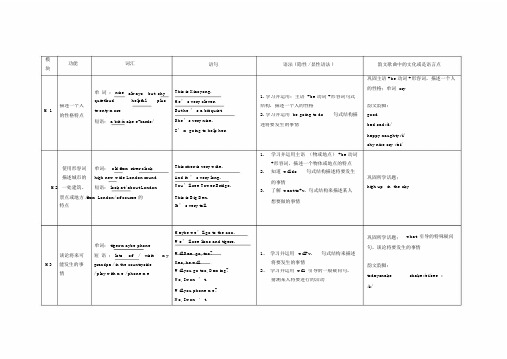
模功能 词汇块单 词 : nice always but shyquietloud helpfulplusM 1描述一个人twenty more的性格特点短语: a bit /make e-cards/使用形容词 单词: old from river clock 描述城市的high new wide London round M2 一处建筑、短语: look at/ about London景点或地方 /from London/ of course 的特点单词: tiger maybe phone谈论将来可短 语 : lotsof / visitmyM3能发生的事 grandpa / in the countryside情/ play with me / phone me语句语法 ( 隐性 / 显性语法 )韵文歌曲中的文化或是语言点巩固主语 +be 动词 +形容词,描述一个人 This is Xiaoyong.的性格;单词 cry1. 学习并运用:主语 +be 动词 +形容词句式 He ’ s very clever.结构,描述一个人的性格韵文韵脚: But he ’ s a bit quiet.句式结构描good 2. 学习并运用 be going to do She ’s very nice.bad sad:/d/ 述将要发生的事情I ’ m going to help her.happy naughty:/i/shy nice cry :/ai/1.学习并运用主语 (物或地点) +be 动词 This river is very wide. +形容词,描述一个物体或地点的特点知道 will do 句式结构描述将要发生2.And it ’ s very long. 的事情巩固所学话题; You ’ll see Tower Bridge.high up in the sky了解 want to+v. 句式结构来描述某人 3.This is Big Ben. 想要做的事情It ’ s very tall.Maybe we ’ll go to the zoo.巩固所学话题; what 引导的特殊疑问 We ’ ll see lions and tigers.句,谈论将要发生的事情Will Sam go, too? 1、 学习并运用 will+v.句式结构来描述Yes, he will.将要发生的事情韵文韵脚:Will you go too, Daming?2、 学习并运用 will 引导的一般疑问句,shake:/ei/see :No, I won ’ t.todaysnake猜测某人将要进行的活动Will you phone me?/i:/No, I won ’ t.:fruit apple orange them We ’ ll pick fruit. 1、 学 并运用 will we ⋯?句式 构 将巩固数字: 11-19 ;tangerine-orange ,pearpeach fourteen Will we pick oranges?来行 的猜 及回答。
外研社一年级起点三年级下册知识点总结

外研社一年级起点三年级下册知识点总结外研社一年级起点三年级下册知识点总结一、语文知识点1. 诗歌教学在三年级下册中,语文教学中诗歌教学占据了重要地位。
通过学习富有节奏感和韵律感的诗歌,培养学生的审美能力和语感,提高学生的语言表达能力。
教学重点包括理解诗歌的意境,感受诗歌的美,培养朗读和背诵诗歌的能力等。
2. 文言文阅读三年级下册开始引入文言文阅读,通过学习古代文化和名著名篇,培养学生对传统文化的兴趣和理解。
重点教学内容包括初识文言文的特点和结构,懂得使用工具书辅助阅读和理解文言文,培养对文言文作品的鉴赏能力。
3. 议论文写作在三年级下册中,学生开始接触较为复杂的议论文写作。
培养学生对一个问题进行分析和思考的能力,学习如何用正面、中性和反面角度来撰写议论文。
教学重点包括梳理论点、举例论证、合理使用辞藻和修辞手法等。
二、数学知识点1. 三角形和四边形在三年级下册数学教学中,学习三角形和四边形是重要的知识点。
学生通过学习认识不同形式的三角形和四边形,了解它们的性质和特点,并能用所学知识解决实际问题。
教学内容包括识别、命名和绘制不同形状的三角形和四边形,认识各种形状的特点,并进行简单的计算和推理。
2. 算式的变形和计算在三年级下册数学教学中,学生开始学习算式的变形和计算,培养学生的数学思维能力和运算技巧。
教学重点包括利用算式的性质进行计算,如加法和乘法的交换律、结合律等;学习算式的变形,如加减法的逆运算,乘法的分配律等。
三、英语知识点1. 句型和语法知识在三年级下册英语教学中,学生开始学习更多的句型和语法知识,提高英语表达能力。
重点教学内容包括基本句型的构成和运用,如动词的时态、代词的使用等;学习一些常用的短语和习惯用法,提高语言表达的准确性和流利度。
2. 阅读理解和写作能力三年级下册英语教学中,培养学生的阅读理解能力和写作能力是重要任务。
教学内容包括培养学生对短文的理解能力,学习提取关键信息和归纳总结;通过阅读和写作活动,激发学生的创造力和表达能力,提高英语功底。
外研社版三年级下册英语M1-M5知识点复习总结

外研社版三年级下册英语M1知识点总结一、词汇1、分类词汇性格类:clever /naughty / nice / shy / quiet / helpful频度副词:usually 通常/always 总是学科类: Chinese / Maths / English /Science / Music / Art / PE二、短语1、a bit shy 有点害羞 a bit quiet 有点文静2、make e-cards 制作电子贺卡3、another friend 另一位朋友4、do her Maths 完成数学作业do his /her + 学科完成某学科作业5、one more 再一个三、句型外研社版三年级下册英语M2知识点总结一、词汇1、字母组合ou 发音/au/ out about 区别a bit2、分类词汇形容词类:long, short /tall, short / big, small / old, new/fat, thin / wide /high /round江河湖海:river / lake / sea建筑类: house /tower / bridge物品类:clock / wheel / kite3、缩写形式will 将,将会区别wheel 轮子you'll = you will 你将we'll = we will be going to +动词原形打算... they'll = they will4.this,that,those,these二、短语1.景点:the River Thames 泰晤士河Big Ben 大本钟the London Eye 伦敦眼Tower Bridge塔桥2.look at... 看......3. be from... 来自...... I'm from Weifang.4. be like... 像...... It's like a big, round eye.5. come to my house 来我家6. want to + 动词原形想要做...7. of course 当然三、句子1、介绍某个景点或建筑:In ... , you'll see ... It's ...2、形容其特点:It's very ...It's a ...It's like a ...一、词汇1、字母组合ea 发音/e/ breakfast bread head/i:/ tea sea eat meat peach read2、分类词汇职业类:farmer / pupil / teacher / doctor / nurse / driver / policeman一日三餐:breakfast / lunch / dinner supper饮料类: water / milk /orange juice / milkshake3. 缩写形式won't = will not / isn't=is not / aren't=are not / can't=can not二、短语1.地点:in the countryside in + 大地点at home at school at + 小地点时间:in spring in + 年,月,季节at 7 at + 时间点2. over there 在那边3. lots of 许多的,大量的表数量:少-多a一个some一些many+可数/ lots of+均可4. go to the zoo 去动物园go to school 去上学5. visit my grandpa 拜访我的爷爷visit Beijing 参观北京visit + 地点/人物6. have breakfast 吃早餐have lunch 吃午餐have dinner/supper 吃晚餐have a tea party 有茶会三、句子含有will 的一般将来时1.特殊疑问句:What will you _____ ? (do/see/read...)I'll/ We'll ______ . will +动词原形2.否定句:I won't see lions there. won't+动词原形3.一般疑问句:Will you _____ this weekend? (go to the park/do your homework/...) Yes, I/we will. No, I/we won't.Will you _____ at ____? (have breakfast /lunch /...)Yes, I/we will ____ at ____. No, I/we will ____ at ____.一、词汇1.分类词汇数字类:one, two, three, four, five, six, seven, eight, nine, ten, eleven, twelve, thirteen, fourteen, fifteen, sixteen, seventeen, eighteen, nineteen一周七天:Sunday, Monday, Tuesday, Wednesday, Thursday, Friday, Saturday 水果类(fruit):apple, pear, peach, orange, banana2. 可数名词变复数+s: apples, pears,oranges, bananas+es: peaches二、短语this weekend 这个周末next weekend 下个周末fruit farm 果园pick fruit 采摘水果other fruit 其它水果let's =let us 让我们has got 有have got 有feel tired 觉得累feel happy 觉得开心三、句子一、含有will 的一般将来时1.肯定句We'll pick fruit.2.一般疑问句Will you pick peaches?Yes, I/we will.No, I/we won't.二.表示担心I'm afraid we can't see all the peaches.三.表达感受I feel tired now.四.提建议Let's go home!√ OK/Good idea / All right.×No, thanks.一、词汇1. tomorrow 明天一般将来时的标志词week 周,星期next week2. Sunday, Monday, Tuesday, Wednesday, Thursday, Friday, Saturday (表时间:at+时间点on+天in+季节和年月)星期词的缩写:Sun. Mon. Tue. Wed. Thur. Fri. Sat.3. why 为什么二、短语good idea 好主意have a picnic 野餐have a tea party 举行茶话会have breakfast/lunch/supper/dinnertake your kite/ball 带上你的...next week 下一周next year 下一年on holiday 度假go swimming 去游泳play with my friends 和我的朋友玩go to the park 去公园do my homework 做作业visit my grandma 拜访我的奶奶help my mother 帮助我的妈妈read my books 读书三、句子一般将来时肯定句:1.On_____, I'll ______.一般疑问句:2.Will you ____ on_____?Yes, I/we will. No, I/we won't.特殊疑问句:3.What will you do on _____?On ____, I'll _____.。
外研版一年级起点三年级下册重点句型及知识点

外研版一年级起点三年级下册重点句型及
知识点
本文档总结了外研版一年级起点三年级下册的重点句型和知识点。
重点句型
1. 我有一个梦想:+ 天空的颜色是蓝色的。
2. + 是 + 的 + 来到 + 地方:小明是我最好的朋友,他来到了我们的学校。
3. + 可以 + 动词原形:我可以唱歌。
4. + 一起 + 做 + 活动:我们一起追风筝。
5. + 地 + 动词原形:小狗高兴地跳起来。
6. + 是 + 别的事物 + 吗?:这是你的书吗?
7. + 日常活动:每天早上我都刷牙洗脸。
8. + 的时候:妈妈弹钢琴的时候,我喜欢听。
9. + 可以 + 的活动:在公园里我们可以玩游戏。
10. + 一起 + 的活动:我们一起做作业。
知识点
1. 基本的人称代词:我、你、他、她、它、我们、你们、他们。
2. 颜色:红色、黄色、蓝色、绿色等。
3. 介词:在、到、上、下、里、外等。
4. 动词原形:唱歌、跳舞、游泳、玩耍等。
5. 形容词:高兴的、快乐的、漂亮的、聪明的等。
6. 时间词:每天、早上、晚上、昨天、明天等。
7. 物主代词:我的、你的、他的、她的、它的、我们的、你们的、他们的。
以上是外研版一年级起点三年级下册的重点句型和知识点,希
望对您有帮助。
外研一起点3下外研版(一起)三年级英语下册 Module 2 Unit 1 练习题

外研版(一起)三年级英语下册Module 2 Unit 1 练习题【典型例题】例:翻译练习:我的兄弟都是大学生。
My brothers are all college students.冬季白天短,夜晚长。
In winter, the days are short and the nights are long.布朗夫人看起来很健康。
Mrs. Brown looks very healthy.十五岁他就成为有名的钢琴家了。
At the age of fifteen he became a famous pianist.孩子们,请保持安静。
Children, keep quiet please.这本书是有关美国历史的书。
This book is about the history of the United States. 她的工作是在幼儿园里照看儿童。
Her job is to look after the children in the nursery.他失业了。
He is out of work.树叶已经变黄了。
The leaves have turned yellow.这个报告听起来很有意思。
The report sounds interesting.例:句型转换精选1. Wei Hua was washing clothes last night. (对画线部分提问)________ ________Wei Hua ________clothes?2. You’d better get to sleep earlier, or you’ll be tired. (同义句转换)If you ________ ________ ________earlier, you won’t be tired.3. While we were talking, the teacher came in. (对画线部分提问)________did the teacher________ ________?4. He saw the bag before his bike hit it. (用until转换)He________ ________the bag ________his bike hit it.5. You help me with English. It’s nice of you. (连成一句)It’s nice of you ________ ________ ________with English.Keys:1.When was; washing 2. get to sleep 3. When; come in4. didn’t see; until5. to help me6. I’m sorry he isn’t here right now.I’m sorry he’s ________the____.7. I hope to see him as soon as possible.I hope to see him as ____as ____ _____.8. He says that he won’t be free until tomorrow.He says that he____ ____free ____tomorrow.9. It’s best to travel by train.____by train ____the ____.Keys:6. out; moment 7. possible; I can 8. will be; before 9. Travelling; is; best例:连词成句:1. last, week, was, the, weather, like, what2. do, did, what, you, yesterday3. a film, he, watched, yesterdayKeys:1. What was the weather like last week?2. What did you do yesterday?3. He watched a film yesterday.例:填空:1. Help_____ to some meat, Mary.A. themselvesB. ourselvesC. yourselfD. himself2. Though they had cleaned the door, there was still __________ water on it.A. littleB. a littleC. fewD. a few3. The old man kept one black dog and two white__________.A. oneB. onesC. thoseD. one’s4. ______ of us has read the newspaper, so we know nothing about it.A. SomeB. BothC. NoneD. All5. He is not a kind- hearted man, ________ people can get on well with him.A. fewB. a fewC. littleD. a littleKeys:1~5 C B B C A6. I’m old enough to wash _______ clothes. You should wash ______, too.A. my, yourB. mine, yoursC. my, yoursD. your, my7. It’s too hot. Give __________ a bottle of orange.A. mineB. heC. herD. our8. When shall we meet again? ___ day is OK.A. EitherB. NeitherC. NoneD. Any9. Which of the two books will you buy? I’ll buy __, so I can give one to Joe.A. eitherB. neitherC. allD. both10. The girls are crying. ________ can’t find __________ mother.A. She, herB. They, themC. They, theirD. They, herKeys:6~10 C C D D C【模拟试题】1. The weather in Guangzhou is hotter than ________ in Shenyang.A. thatB. itC. thisD. one2. Mr. Green is our English teacher. _____comes from U. S. A.A. HeB. SheC. ItD. They3. My bike is broken. May I borrow________?A. youB. yourselfC. yoursD. your4. Would you like some tea? Yes, just_________.A. a fewB. fewC. a littleD. little bit5. Would you like some tea or coffee? _________. Thanks, I’ve had enough.A. EitherB. NeitherC. SomeD. Both6. I bought ___________ exercise books with __________ money.A. a few, a fewB. a few, a littleC. a little, a fewD. a little, a little7. I made the cake by ____________. Help __________, Tom.A. ourselves, yourselfB. myself, yourselfC. myself, youD. me, him8. Enjoy_____________, May and Mary.A. yourselfB. myselfC. yourselvesD. themselves9. _____________ h ouse is this ? It’s mine.A. WhatB. WhoC. WhoseD. Whom10. She is a student and ____________ name is Mary.A. sheB. herC. hersD. his11. She will go skating and I will do _________.A. suchB. sameC. the same asD. the same12. __________ is he? He is a bus driver.A. WhoB. WhichC. ThatD. What13. _____ hat is this? It’s __________.A. Whose, meB. Who, mineC. Whom, hisD. Whose, mine14. The population of China is larger than __________ of Japan.A. oneB. itC. thatD. those15. Li Li is clever than _______ in his class.A. anybodyB. anyone elseC. else anyoneD. somebody else16. _________ like music.A. Both of themB. Both of theyC. The both girlsD. Both them17. Could you give me some ink? Sorry, I have__________ in my bottle.A. a fewB. fewC. a littleD. little18. He has ___________ to tell us.A. something importantB. important somethingC. anything usefulD. useful nothing19. Would you like ___________ coffee? Yes, I’d like ______________.A. any, anyB. some, someC. some, anyD. any, some20. _________ of the teachers are OK in our school.A. EveryB. EachC. EitherD. All21. Of the three foreigners, one is from London, ________ are from the USA.A. two othersB. the other twoC. another twoD. the both22. Which would you like, sir, tea or coffee? I don’t mind. _______ is OK.A. EitherB. NeitherC. AnyD. Both23. Help __________ to some chicken, boys and girls.A. youB. yoursC. yourselfD. yourselves24. What do you usually have for breakfast? ______ milk and ______ eggs.A. Little, a littleB. A few, fewC. A little, a fewD. A few, a little25. Who taught ______ history last year? Nobody! He learned it _________.A. him, himselfB. his, himselfC. himself, himselfD. his, him26. There isn’t _______ paper here. Will you go and get __________for me?A. any, anyB. any, someC. much, manyD. many, much27. The farmer is busy because he’s so __ sheep to keep and so __ work to do.A. much, manyB. many, muchC. many, a lotD. a lot, much28. On _______ side of the river there’re m any tall trees.A every B. all C. both D. each29. Whose photo is this? It’s __________.A. meB. mineC. myD. myself30. Who is playing the piano in the next room? _______ is Li Ping’s brother.A. ThisB. ThatC. ItD. He31. The old man has two sons, but __________ of them lives with him.A. bothB. noneC. neitherD. all32. You have more apples than I, but _____ are bigger than_________.A. my, yourB. my, yoursC. mine, yourD. mine, yours33. There is ________ meat at home. Would you please go and buy______?A. some, a littleB. a little, anyC. little, someD. little, any34. My parents are workers. _______ both work in the same factory.A. ThemB. TheyC. HeD. She35. Can you come on Friday or Saturday? I’m afraid _______ day is possible.A. eitherB. sameC. noneD. neither36. He can’t hear you, because there is _____ noise here.A. very muchB. too muchC. much tooD. so many37. All of us were invited, but _______ of us came.A. neitherB. noneC. bothD. any38. There isn’t __________ water in the cup.A. anyB. manyC. someD. the39. We have _________ sugar. Really? Let’s go and buy some.A. fewB. a fewC. littleD. a little40. There isn’t ____________ milk in the fridge. You’d better buy some.A. noB. anyC. someD. a few【试题答案】1~5 A A C C B6~10 B B C C B11~15 D D D C B16~20 A D A B D 21~25 B A D C A26~30 B B D B C31~35 C D C B D36~40 B B A C B。
外研社版英语三年级起点三年级下册全册知识整理汇总含单词词汇词组短语句子句型
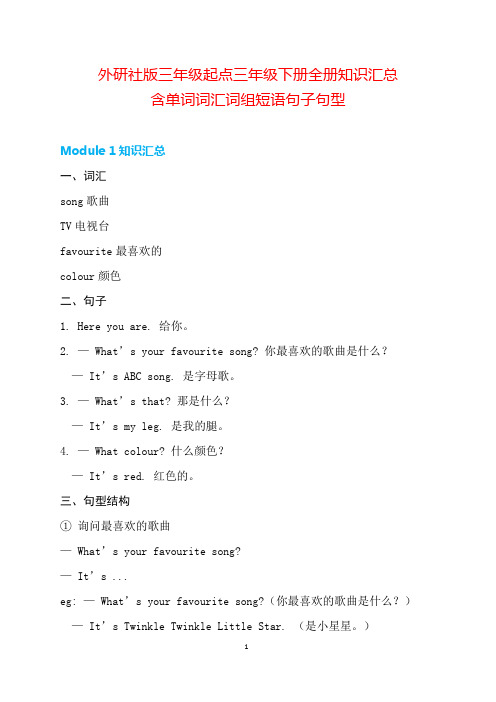
外研社版三年级起点三年级下册全册知识汇总含单词词汇词组短语句子句型Module 1知识汇总一、词汇song歌曲TV电视台favourite最喜欢的colour颜色二、句子1. Here you are. 给你。
2. — What’s your favourite song? 你最喜欢的歌曲是什么?— It’s ABC song. 是字母歌。
3. — What’s that? 那是什么?— It’s my leg. 是我的腿。
4. — What colour? 什么颜色?— It’s red. 红色的。
三、句型结构①询问最喜欢的歌曲— What’s your favourite song?— It’s ...eg: — What’s your favourite song?(你最喜欢的歌曲是什么?)— It’s Twinkle Twinkle Little Star. (是小星星。
)②询问你最喜欢的颜色— What’s your favourite colour? (你最喜欢的颜色是什么?)— It’s + 颜色词.eg: — What’s your favourite colour? (你最喜欢的颜色是什么?)— It’s green. (是绿色。
)③询问那是什么— What’s that?— It’s ...eg: — What’s that? (那是什么?)— It’s my book. (是我的书。
)Module 2知识汇总一、词汇they他(她/它)们they’re = they are他(她/它)们是monkey猴子baby幼兽,幼畜all每个;全体zoo动物园tiger老虎lion狮子elephant大象fat胖的man人,男人short矮的tall高的small小的thin瘦的big大的二、句子1. — What’s this? (这是什么?)— It’s a tiger. (它是只老虎。
外研版小学英语(一起)三年级下册知识点汇总
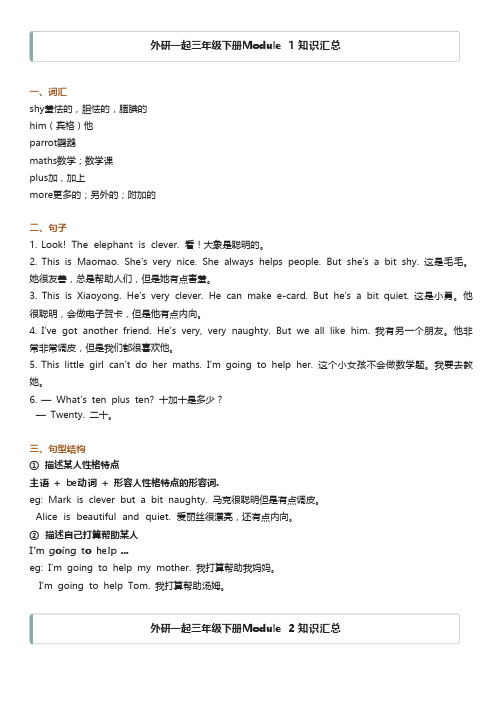
外研一起三年级下册Module 1 知识汇总一、词汇shy羞怯的,胆怯的,腼腆的him(宾格)他parrot鹦鹉maths数学;数学课plus加,加上more更多的;另外的;附加的二、句子1.Look!The elephant is clever.看!大象是聪明的。
2.This is Maomao.She’s very nice.She always helps people.But she’s a bit shy.这是毛毛。
她很友善,总是帮助人们,但是她有点害羞。
3.This is Xiaoyong.He’s very clever.He can make e-card.But he’s a bit quiet.这是小勇。
他很聪明,会做电子贺卡,但是他有点内向。
4.I’ve got another friend.He’s very,very naughty.But we all like him.我有另一个朋友。
他非常非常调皮,但是我们都很喜欢他。
5.This little girl can’t do her maths.I’m going to help her.这个小女孩不会做数学题。
我要去教她。
6.—What’s ten plus ten? 十加十是多少?— Twenty. 二十。
三、句型结构①描述某人性格特点主语+be动词+形容人性格特点的形容词.eg:Mark is clever but a bit naughty.马克很聪明但是有点调皮。
Alice is beautiful and quiet.爱丽丝很漂亮,还有点内向。
②描述自己打算帮助某人I’m going to help ...eg:I’m going to help my mother.我打算帮助我妈妈。
I’m going to help Tom. 我打算帮助汤姆。
外研一起三年级下册Module 2 知识汇总一、词汇about关于river河wide宽的,宽阔的;宽广的old年代久的,古老的clock钟,时钟wheel轮子round圆形的;球形的will将,将会you’ll =you will 你将tower塔bridge桥二、句子1.This house is big,but that one is small. 这座房子是大的,但是那座房子是小的。
外研社一起小学三年级下英语总结及练习题
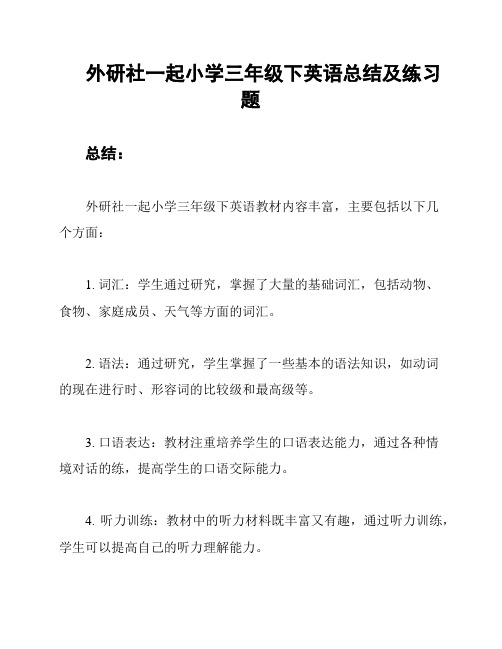
外研社一起小学三年级下英语总结及练习
题
总结:
外研社一起小学三年级下英语教材内容丰富,主要包括以下几
个方面:
1. 词汇:学生通过研究,掌握了大量的基础词汇,包括动物、
食物、家庭成员、天气等方面的词汇。
2. 语法:通过研究,学生掌握了一些基本的语法知识,如动词
的现在进行时、形容词的比较级和最高级等。
3. 口语表达:教材注重培养学生的口语表达能力,通过各种情
境对话的练,提高学生的口语交际能力。
4. 听力训练:教材中的听力材料既丰富又有趣,通过听力训练,学生可以提高自己的听力理解能力。
练题:
1. 选择题:
a. My mother is a ____. (teacher, student, doctor)
b. The cat is ____ the table. (on, under, in)
c. I have ____ pencils. (a, an, some)
2. 填空题:
a. There ____ a book and some pens on the desk.
b. --____ is the weather today? --It's sunny.
c. We ____ to the park last Sunday.
3. 句子翻译:
a. 他喜欢吃水果。
b. 这是我的新书。
c. 我们每天都去上学。
请根据以上题目进行练,加强对外研社一起小学三年级下英语教材内容的理解和运用。
- 1、下载文档前请自行甄别文档内容的完整性,平台不提供额外的编辑、内容补充、找答案等附加服务。
- 2、"仅部分预览"的文档,不可在线预览部分如存在完整性等问题,可反馈申请退款(可完整预览的文档不适用该条件!)。
- 3、如文档侵犯您的权益,请联系客服反馈,我们会尽快为您处理(人工客服工作时间:9:00-18:30)。
三年级下语法一般将来时一、一般将来时的定义:一般将来时表示在将来时间将要发生的动作或存在的状态,与表示将来的时间连用。
tomorrow, next day(week, month, year…),soon, the day after tomorrow(后天)等。
如:She will visit Shanghai tomorrow.二、一般将来时的构成1.主语+shall/will+do2. 主语+ be going to + do 在表示“打算到某地去时”由于谓语动词go与going重复,一般可以只说be goingto a place。
三、一般将来时的用法1.主语+shall/will+do (will可用于所有人称,shall只用于第一人称I和we) 这种结构不是表示自己的打算、意图或计划,而是表示未来的事实或对将来的预测等如:No one will do heavy work.Roberts will do everything for us.2.主语+ be going to + do这种结构常用来表达自己打算做某事、计划做某事或者有意做某事。
注意:be 动词要与主语的人称和数一致,如:I am going to do some reading tomorrow.He is going to have a piano lesson next week.We are going to have a party this Friday.四、通常情况下will 和be going to能互换,但是be going to 与will 用法的也是有点区别的1. 只用will不用be going to的情况:①表示对未来时间与年龄的推测时,如:Tomorrow will be Monday.She will be thirteen next year.②表示必然发生时,如:Fish will die without water.People will die if all green plants die.2.只用be going to而不用will的情况:如果表示已有迹象表明在不久的将来要发生的事情时,如:Look at those black clouds, It’s going to rain.五、一般将来时的句式变换肯定句:主语+shall/will+do主语+ be going to + do否定句:主语+shall/will+not+do(will not 可缩写成won’t)主语+ be+ not+ going to +do一般疑问句:shall/will+主语+ dobe+主语+going to+do特殊疑问句:疑问词+ shall/will+主语+do疑问词+be+主语+going to+do练习题一、按要求填空1. 我打算明天和朋友去野炊。
I_____ _______ _________ have a picnic with my friends.I ________ have a picnic with my friends.2. 下个星期一你打算去干嘛? 我想去打篮球。
What ________ ________ _________ _________ _________ next Monday?I _______ ______ _____ play basketball. What _________ you do next Monday?I ________ play basketball.3. 你妈妈这个周末去购物吗?是,她要去买一些水果。
_____ your mother _______ ________ go shopping this ___________? Yes, she _________. She ______ ________ __________ buy some fruit.4. 你们打算什么时候见面。
What time _______ you _________ __________ meet?改句子5. Nancy is going to go camping.(改否定)Nancy ________ going to go camping.6. I’ll go and join them.(改否定)I _______ go ______ join them.7. I’m going to get up at 6:30 tomo rrow.(改一般疑问句)________ _______ ________ to get up at 6:30 tomorrow?8. We will meet at the bus stop at 10:30.(改一般疑问句)_______ ________ meet at the bus stop at 10:30.9. She is going to listen to music after school.(对划线部分提问)________ _______ she ________ ________ _________ after school?10. My father and mother are going to see a play the day after tomorrow.(同上) _________ _________ going to see a play the day after tomorrow.用所给词的适当形式填空。
11. Today is a sunny day. We ___________________ (have) a picnic this afternoon.12. My brother _______________ (go) to Shanghai next week.13. Tom often ______________(go) to school on foot. But today is rain. He ______________ (go) to school by bike.14. What do you usually do at weekends? I usually ________ (watch) TV and ________(catch) insects?15. It’s Friday today. What _____she _________ (do) this weekend? She ______________ (watch) TV and _____________ (catch) insects.16. What ___________ (d0) you do last Sunday? I ____________ (pick) apples on a farm.What ______________ (do) next Sunday? I ______________ (milk) cows.17. Mary ____________ (visit) her grandparents tomorrow.18. Liu Tao ____________ (fly) kites in the playground yesterday.19. David ______________ (give) a puppet show next Monday.Was,were的一般过去时一、be动词包括“am”, “is”, “are”三种形式。
1. 第一人称单数(I)配合am来用。
句型解析析:I am+…2. 第二人称(You)配合are使用。
句型解析:You are+…3. 第三人称单数(He or She or It)配合is使用。
句型解析:She(He, It) is +…4. 人称复数(we /you/they)配合are使用。
句型解析:We (You, They) are +…be动词前面的人称,是不可随意替换的。
例如:I am, You are, She is,并不会出现I is, You am, She are 这样的情形。
二、Be动词在一般过去时中的变化:1. am 和is在一般过去时中变为was。
(was not = wasn’t)2. are在一般过去时中变为were。
(were not = weren’t)3.带有was或were的句子,其否定、疑问的变化和am, is, are一样,即否定句在was或were后加not,一般疑问句把was或were调到句首练习题一、改写句子:1、Lucy did her homework at home.(改否定句)Lucy ________ _______ her homework at home.2、He found some meat in the fridge(冰箱).(变一般疑问句)___________ he __________ ___________ meat in the fridge?3、There was some orange in the cup.(变一般疑问句)_______ there _______ orange in the cup?4. Frank read an interesting book about history. (一般疑问句)_______ Frank _______ an interesting book about history?5. Why not go out for a walk? (同义句)_______ ________ ________ out for a walk?6. Thomas spent RMB 10 on this book. (否定句)Thomas______ _____RMB 10 on this book.7. My family went to the beach last week. (划线提问)________ ________ ________ family _______ last week?8. I think she is Lily’s sister. (否定句。
注意否定转移)____________________9. Sally often does some reading in the morning. (否定句)Sally _______ often ______ some reading in the morning.10. He is a tall, thin boy. (划线提问)_______ _______ he _______ ________?二、改错题(1.How is Jane yesterday? _____________________2.He go to school by bus last week. ____________________________3.He often goes home at 6:00 last month. ____________________________4.I can fly kites seven years ago. ______________________________5.Did you saw him just now. ____________________________________6.Tom wasn’t watch TV last night. ____________________________________7.I didn’t my homework yesterday. ____________________________________8.He wait for you three hours ago. ____________________________________9.Who find it just now ? ________________________________________10.What make him cry (哭) just now? ________________________________。
